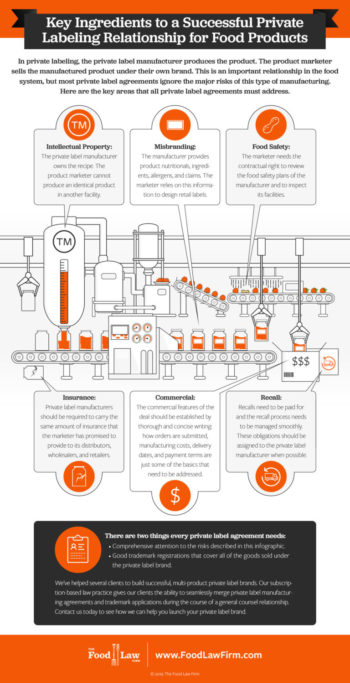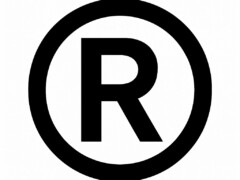The Food Law Firm can help draft and negotiate private label agreements from either the perspective of manufacturers or purchasers. Get in touch to find out how.
Private Label Agreements
Private label Agreements can be so much more than an opportunity to create a product. Talking about private label agreements starts a conversation about food safety, insurance exposure, quality control, commercial agreements, and intellectual property.
What Are Private Label Agreements?
Private label agreements are a type of manufacturing agreement used to produce many products, including foods, supplements, and cosmetics. In private labeling, a manufacturer agrees to produce its own recipe and formula. The purchaser-customer then markets under their branding and trademarks.
It is essential to address issues like proper food and nutrition labeling, food safety, food recall liability, and the intellectual property issues related to product formulation.
Why Use Private Label Agreements?
From the manufacturer’s perspective, private label agreements maximize production potential without the need to build retail markets for the product. A manufacturer can get the product on more shelves without the expense of funding more marketing.
From the Marketer’s perspective (the “Marketer” being the company that buys the products to sell them on the open market) , margins on private label goods are better, which gives Marketers more economic bargaining power with suppliers of national brands. Private label agreements give major retailers like Amazon the capability to rapidly expand product offerings with minimal investment (both capital and intellectual) in food processing and production.
Neither party realizes the true benefits of private labeling unless they document the manufacturing agreement in writing. A good private label agreement needs to identify and address the major risks of contract manufacturing of a food product.
The risks are:
- Maintaining solid control over intellectual properties like product formulas.
- Marketing a misbranded product.
- Inadequate manufacturing practices that result in sick customers or product recalls.
- The basic risks inherent in any manufacturing or supply relationship – quality of goods, timing of delivery, price, and risk of loss.
What to Include in Your Private Label Agreement
Intellectual Property. The critical feature of these agreements is an acknowledgement that the manufacturer retains ownership of the product recipe after the relationship. For the manufacturer, the benefits are obvious – they get to retain control of how the product is used in the marketplace. For the Marketer, private labeling creates a dependency problem because the product can only be purchased from a single manufacturer. The better the private label product performs for the Marketer, the more dependent the Marketer becomes on the manufacturer. Success for the Marketer creates a bargaining power disparity in the relationship. A Marketer can address the imbalance with various types of contracts, like requirements contracts. These contracts may help fix prices during the term.
Recalls. A private label agreement should address which party bears responsibility for product recall expenses.
Product Details. The manufacturer needs to provide the marketer with a Specification Sheet for the product. As we’ve covered on our blog page, the product specification is just about the most important document in the food industry. The information on the Specification sheet will form the basis for all product labeling and marketing. The Specification Sheet should include product nutritional information, a list of all product ingredients, and allergen declarations, and as many objective details about the finished product as possible, such as pH, water activity, viscosity, color. The Specification is the manufacturer’s warranty for the products against which the finished product is compared upon delivery.
Extra Credit
Oversight. The marketer of the product should have access to the food safety records of the manufacturer that pertain to the manufacturing of the product. Total transparency is the goal. Both the manufacturer and the marketer have a duty to produce wholesome food. If a marketer has access to the food safety documentation of the manufacturer, the marketer’s own food safety and quality control professionals can check the work of the manufacturer.
The commercial features of the deal should be established by thorough and concise writing: how orders are submitted, manufacturing costs, delivery dates, and payment terms are just some of the basics that need to be addressed.
Our subscription service
Clients realize the greatest value out of our services when they stack them together comprehensively. Our subscription-based service plans enable our clients to weave our services into the fabric of their businesses at affordable and predictable rates.
















